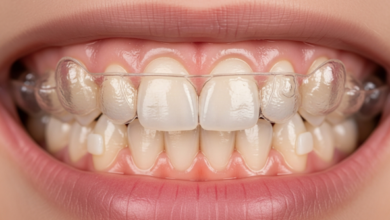How to Strengthen Your Skin Barrier Without Harsh Products

The skin barrier’s health is crucial for maintaining the skin’s integrity and function. The barrier protects against environmental stressors, such as pollutants and harsh weather, while retaining moisture to prevent dryness and irritation. For those seeking to preserve their skin’s vitality, there are gentler ways to bolster the skin barrier without resorting to harsh products that could further compromise skin health.
Understanding the Skin Barrier
The outermost layer of the skin, known as the stratum corneum, forms the skin barrier. This layer comprises dead skin cells held together by a matrix of lipids and proteins. When this barrier is compromised, the skin becomes vulnerable to infections, inflammation, and dehydration. Preserving the integrity of the skin barrier is therefore paramount for overall dermatological well-being.
See also: Naturopath London Ontario Comprehensive Guide to Natural Health Solutions
The Role of Gentle Skincare
Gentle skincare involves using products and techniques that do not disrupt the natural balance of the skin. Harsh products that contain sulfates, alcohol, and synthetic fragrances can strip away natural oils, leading to a compromised barrier. Opting for hypoallergenic, pH-balanced, and fragrance-free products can help maintain the barrier while being less likely to cause irritation.
Hydration and Its Importance
Hydration is key to a robust skin barrier. Moisturising agents, such as hyaluronic acid and glycerin, attract water to the skin and help lock in moisture. A well-hydrated skin barrier is more pliable and better equipped to repair itself and defend against environmental aggressors.
Nutrition and Skin Health
A balanced diet rich in vitamins, minerals, and essential fatty acids contributes to skin barrier strength. Essential fatty acids, particularly omega-3 and omega-6, support the lipid content of the skin, which is instrumental in maintaining the skin’s elasticity and barrier function. Antioxidants such as vitamins A, C, and E can also protect the skin from oxidative stress.
The Importance of Sun Protection
Exposure to ultraviolet (UV) rays can deteriorate the skin barrier, leading to premature ageing and an increased risk of skin conditions. Using a broad-spectrum sunscreen with at least SPF 30 is crucial for shielding the skin from harmful UV rays, thereby supporting barrier integrity.
The Role of Sleep in Skin Repair
During sleep, the skin goes through a repair process, regenerating and recovering from the day’s environmental stressors. Ensuring adequate sleep is important for maintaining not just overall health but also for supporting the skin’s self-healing mechanism.
Non-irritating Exfoliation
Gentle exfoliation can aid in the removal of dead skin cells and boost cell turnover without damaging the skin barrier. Chemical exfoliants like lactic acid or enzymes provide a milder alternative to physical exfoliants, which can sometimes be too abrasive for sensitive skin.
The Emergence of Barrier Repair Treatments
Recently, there has been a surge in treatments specifically designed to repair and support the skin barrier. Among these is the rejuran barrier repair treatment. This type of treatment is formulated to rejuvenate and restore the skin’s natural barrier, improving skin texture and resilience against external factors.
Advanced treatments like rejuran barrier repair are becoming increasingly popular due to their effectiveness in helping to maintain skin health. They often combine polynucleotides and other restorative ingredients that promote healing and reinforce the skin’s natural defences.
Avoiding Over-cleansing and Over-exfoliation
While cleansing and exfoliating are important steps in any skincare routine, overdoing these practices can harm the skin barrier. It is recommended to cleanse no more than twice daily and to exfoliate only a few times per week to prevent damage to the skin’s protective layer.
Choosing the Right Fabrics
Clothing and textiles that come into contact with the skin can impact barrier health. Fabrics that are too rough or that trap heat and moisture can aggravate the skin. Opting for breathable, soft, and hypoallergenic materials can help minimise irritation and support skin barrier function.
Understanding Product Ingredients
Becoming informed about the ingredients used in skincare products is essential. Some ingredients may be marketed as beneficial but could disrupt the skin’s pH balance or degrade the lipid matrix that forms the barrier. Selecting products with components suited to one’s skin type is a step towards a stronger skin barrier.
Professional Guidance
Seeking advice from dermatological experts can provide guidance tailored to individual skin needs. Dermatologists can recommend specific regimens and treatments and may suggest procedures such as rejuran barrier repair for those seeking targeted solutions for their skin concerns.
Defending Against Environmental Stress
Environmental factors such as pollution, smoke, and extreme temperatures can weaken the skin barrier. Employing the use of antioxidants in skincare routines, along with regularly cleansing the skin of pollutants, can help mitigate environmental impacts on the skin barrier.
Embracing a Holistic Approach
Supporting the skin barrier is not solely about applying topical products. It entails a holistic approach that includes lifestyle choices such as diet, hydration, sleep, and protection from environmental harms. For those with specific concerns or seeking enhanced repair, considering professional treatments like rejuran barrier repair could provide additional benefits.
Ultimately, a gentle, educated approach to skincare can reinforce the skin barrier effectively without the need for harsh products. Through preventive measures and deliberate care, individuals can foster stronger, healthier skin that is resilient against both environmental and internal stress factors.




